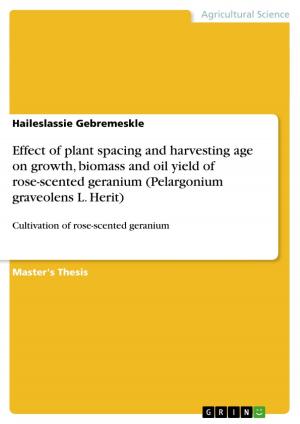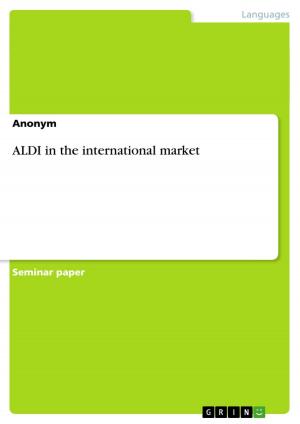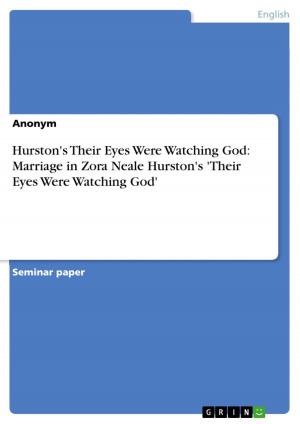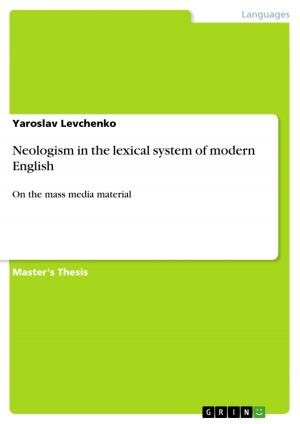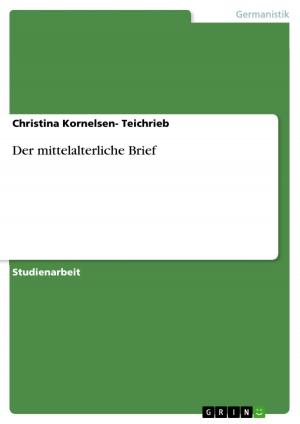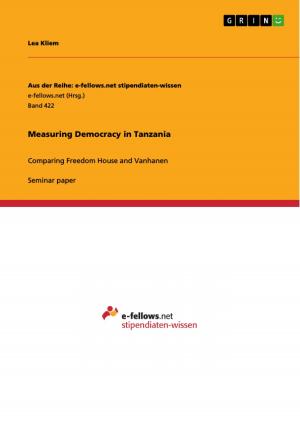| Author: | Thomas Vetsch | ISBN: | 9783638217958 |
| Publisher: | GRIN Publishing | Publication: | October 1, 2003 |
| Imprint: | GRIN Publishing | Language: | English |
| Author: | Thomas Vetsch |
| ISBN: | 9783638217958 |
| Publisher: | GRIN Publishing |
| Publication: | October 1, 2003 |
| Imprint: | GRIN Publishing |
| Language: | English |
Seminar paper from the year 2001 in the subject English Language and Literature Studies - Linguistics, grade: Good, University of Zurich (English Seminar), 10 entries in the bibliography, language: English, abstract: The history of dictionaries certainly goes back to the 8th century, when the custom of making collections of glosses grew up. These collections, called glossarium or glossary, were a great help to students, as they were also a sort of dictionary. In the 10th century, Abbot Ælfric produced a Latin grammar book, including a short Latin-English dictionary - the first of its kind. In 1440 Galfridus Grammaticus produced the first English-Latin dictionary which was printed in 1499 by Pynson and bore the title Promptorium parvulorum sive clericorum. Until the 16th century, the emphasis of dictionaries lay on translating foreign words into English. Apparently, there was no need for an English-English dictionary, i.e. a dictionary which described English words to English people. In that time a lot of foreign words, mostly Latin ones, made their way into 'standard' English, which at first caused no debate but then was criticised by language purists. According to them English was in danger of being taken over by foreign languages and needed special support. This idea was the beginning of English-English dictionaries. In 1604 Robert Cawdry brought out his Table Alphabetical. About three thousand 'hard' words which had become common in English were listed and explained. Henry Cockeram produced the first work with the title The English Dictionary in 1623. Like other dictionaries of that time, it primarily dealt with 'difficult' English words. A polyglot dictionary of eleven languages was published in 1617 by John Minsheu. The Ductor in Linguas was the most monumental dictionary in the 17th century and for the first time, etymology was given some attention. In 1674 John Ray produced a dictionary which dealt with dialect words. It was an unexpected success and people all over the country began looking for additional local terms and sent them to Ray, who brought out a second and enlarged edition of this dictionary in 1691. John Ray can be regarded as the 'remote originator of the English Dialect Society' (Mathews 1966, p. 26). Until then, dictionaries followed the line of old glossaries and only dealt with terms which were not common or rather unusual in the English language. This changed in the 18th century when the first attempts to publish dictionaries containing all English words were made. In 1702 John Kersey published A New English Dictionary; or, a complete collection of the most proper and significant words, commonly used in the language... [...]
Seminar paper from the year 2001 in the subject English Language and Literature Studies - Linguistics, grade: Good, University of Zurich (English Seminar), 10 entries in the bibliography, language: English, abstract: The history of dictionaries certainly goes back to the 8th century, when the custom of making collections of glosses grew up. These collections, called glossarium or glossary, were a great help to students, as they were also a sort of dictionary. In the 10th century, Abbot Ælfric produced a Latin grammar book, including a short Latin-English dictionary - the first of its kind. In 1440 Galfridus Grammaticus produced the first English-Latin dictionary which was printed in 1499 by Pynson and bore the title Promptorium parvulorum sive clericorum. Until the 16th century, the emphasis of dictionaries lay on translating foreign words into English. Apparently, there was no need for an English-English dictionary, i.e. a dictionary which described English words to English people. In that time a lot of foreign words, mostly Latin ones, made their way into 'standard' English, which at first caused no debate but then was criticised by language purists. According to them English was in danger of being taken over by foreign languages and needed special support. This idea was the beginning of English-English dictionaries. In 1604 Robert Cawdry brought out his Table Alphabetical. About three thousand 'hard' words which had become common in English were listed and explained. Henry Cockeram produced the first work with the title The English Dictionary in 1623. Like other dictionaries of that time, it primarily dealt with 'difficult' English words. A polyglot dictionary of eleven languages was published in 1617 by John Minsheu. The Ductor in Linguas was the most monumental dictionary in the 17th century and for the first time, etymology was given some attention. In 1674 John Ray produced a dictionary which dealt with dialect words. It was an unexpected success and people all over the country began looking for additional local terms and sent them to Ray, who brought out a second and enlarged edition of this dictionary in 1691. John Ray can be regarded as the 'remote originator of the English Dialect Society' (Mathews 1966, p. 26). Until then, dictionaries followed the line of old glossaries and only dealt with terms which were not common or rather unusual in the English language. This changed in the 18th century when the first attempts to publish dictionaries containing all English words were made. In 1702 John Kersey published A New English Dictionary; or, a complete collection of the most proper and significant words, commonly used in the language... [...]

